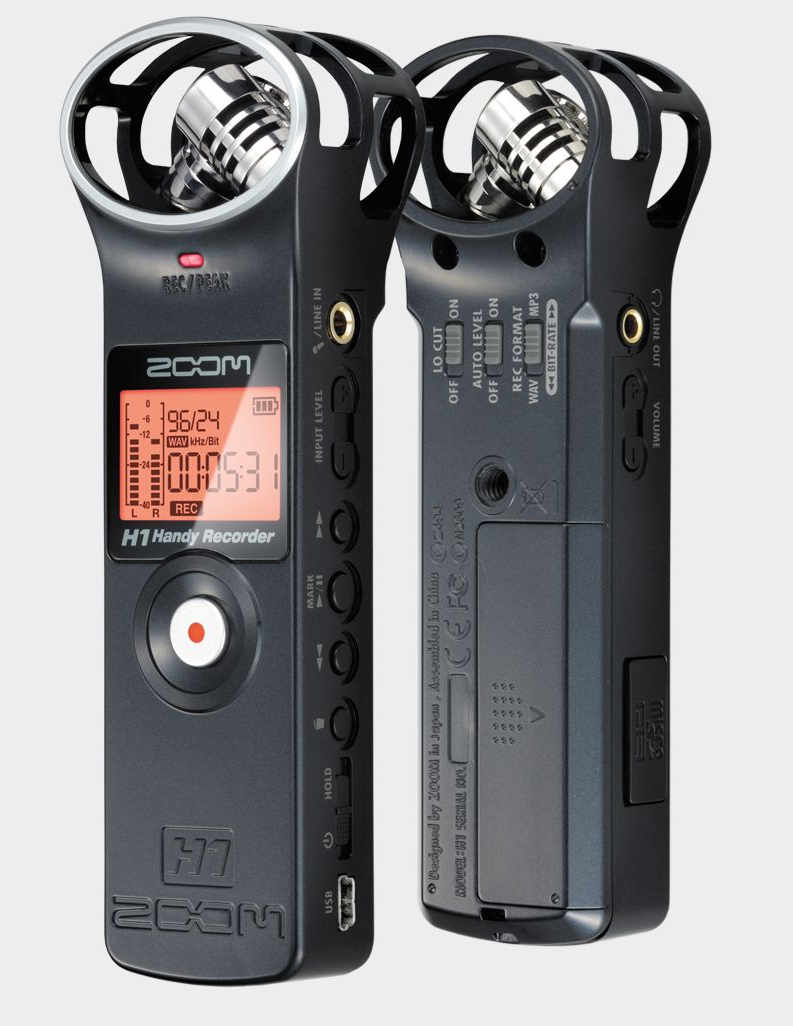
Description
The ultra-compact H1 Handy Recorder brings new meaning to the term "portability." Small enough to slip in your pocket, it offers professional-quality stereo recording at an incredibly affordable price. Take it with you wherever you go—live concerts and band rehearsals, location video shoots, lectures, and meetings—or use it to capture your musical ideas whenever inspiration strikes.
You can count on your H1 to deliver pristine audio wherever you go. Here are just a few ways it can be used:
- Recording live concerts and rehearsals.
- Capturing audio for video.
- Documenting lectures and meetings—faster and easier than taking notes!
- Conducting interviews in the field.
- Capturing song ideas.
X/Y recording made simple
The X/Y technique provides a great way to cover a wide area while still capturing sound sources in the center with clarity and definition, making it perfect for all types of live stereo recording.
The H1's built-in X/Y microphone provides two matched unidirectional microphones set at a 90 degree angle relative to one another, optimum for most stereo recording applications.
Alternatively, you can connect a pair of external microphones or line level signal to the H1's Mic/Line Input mini phone jack for X/Y or other types of stereo recording.
The Ins and Outs
The H1 Mic/Line Input is a stereo ⅛" mini phone jack that can accept two mic- and/or line-level signals. Condenser microphones requiring Plug-In Power (2.5 volts) can be connected to this jack.
The H1 Line/Headphones Output is a stereo ⅛" phone jack with a dedicated volume control. Headphones can be connected here for private monitoring. There's also a built-in speaker on the back panel for fast monophonic monitoring of the recorded signal without the need to make any connections.
The H1's USB port provides a digital output of the stereo mix and allows data to be sent to and from your computer. From there, it can be imported into editing software such as the supplied WaveLab LE. It also allows the H1 to be used as a 2-in/2-out audio interface and USB microphone, as well as a microSD card reader.

Auto Level and low cut filter
The H1's Auto Level function sets input gain automatically to prevent
overload and distortion. Alternatively, input level can be set manually.
The H1 also provides a built-in low cut filter for the elimination of pops,
wind noise, blowing, and other kinds of low frequency rumble.
File types supported
![]()
The H1 records audio in two different basic file types: WAV and MP3. The main difference between the two is that WAV files are uncompressed; that is, they contain all the recorded signal without any data being removed. The WAV files recorded by the H1 can be either 16- or 24-bit, with sampling rates of 44.1, 48, or 96 kHz, and are automatically time-stamped, making them Broadcast Wave Format (BWF) compliant—especially important when recording audio for video since it allows for precise synchronization in post-production.
MP3 recordings are compressed, which means that some unnecessary data is removed prior to storage, making them much smaller than WAV files, and thus much easier to upload and download. Some MP3 files exhibit a slight loss of audio fidelity as compared with the original signal; however, this is not noticeable in all circumstances.
The H1 requires just a single AA battery—either alkaline or rechargeable NiMH—for power. Battery life when using an alkaline battery is up to 10 hours, even during continuous recording. Alternatively, you can use an optional AD-17 AC adapter, which allows you to power the H1 from any standard wall socket.
The H1 records directly to microSD and microSDHC cards, up to 32 gigabytes. The chart below shows maximum recording time with different file formats and card sizes.

*Recording times are approximations. Actual times may differ according to recording conditions.
*The maximum file size is limited to 2 GB.
